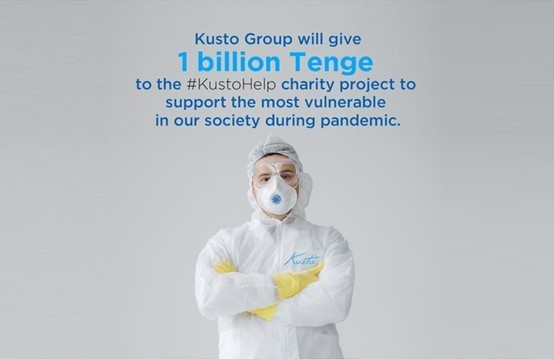
Governments, businesses and charities must cooperate in order to build long-term resilience in times of crises such as the current COVID-19 pandemic, founding chairman of Kusto Group, Yerkin Tatishev, says.
Since the outbreak of the Coronavirus in December 2019, societies all over the world have been forced to adapt to the new reality of social distance, online meetings and classes as well as an unprecedented usage of alcogel.
Businesses in various fields have been hit hard, prompting some of them to file for bankruptcy or cut back on their employees.
Therefore, Yerkin Tatishev believes that it is important that countries across the globe prepare themselves for future crises.
"In business you learn that when you have steady processes already ingrained - you have all systems in place, the right leaders, the right specialists, local competencies - you can adapt far better to a disaster or disruption," the Kusto Group founder explains.
"If anything, a crisis is a perfect moment to remove all unnecessary procedures, meetings, layers and bottlenecks. In other words, companies that have effective structures in good times are in a much better position to handle the bad times," Yerkin Tatishev continues.
Because of this, divisions of Kusto Group have upheld their performances during the pandemic.
Even though Yerkin Tatishev does not think that any nations nor companies have handled the pandemic perfectly, he points out that countries with good governance have come out of the COVID-19 crisis much stronger than those without.
"This learning is a perfect illustration of the need to reform structures if we are to be resilient in the long term," Yerkin Tatishev adds.
Yerkin Tatishev: Patience and a plan is required
Yerkin Tatishev established Kusto Group in Kazakhstan in 2002, and being from a former Soviet country himself, he is no stranger to uncertain financial times.
"My generation in the former Soviet countries went through a similar experience of massive economic and social shock in the 1990s when the USSR collapsed. Having grown through those difficult years, we perhaps have a better sense of perspective now. We know that in order to survive a crisis and flourish afterwards, patience and a plan for the future is required," he says.
Therefore, long-term resilience is important, according to Yerkin Tatishev.
"Quick wins are always in demand, often without any real consideration for their long-term impact. One can see this in business and politics across all societies, only exacerbated in times of crisis. Amid the general panic, the idea that 'something must be done, this is something, therefore we must do it' often takes hold," he explains.
Financial help is an investment in the future
With the pandemic still raging, Yerkin Tatishev thinks it is essential that governments continue to help fight the economic impact of the virus, as it is an investment in the future.
"Businesses take years to build up, involving massive investments of time, money and effort. The cost of letting them collapse is far greater than supporting them through the crisis. They also, of course, have a responsibility to support their workforce, local communities and partners through these difficult times," Yerkin Tatishev states.
In order to prepare for future crises, the Kusto Group founder believes that education and digitalization are keys to providing resilience.
"With schooling and university now largely being held online, poverty has become a greater predictor than ever of success, as good access to the internet becomes a necessity. The rapid digitalization of our economies likewise means that those countries, businesses and workers with poor connectivity will struggle to keep up," Yerkin Tatishev says.

Kusto Group donates millions to people affected by the pandemic
In April, Kusto Group announced that it would donate 1 billion Kazakhstani Tenge (an estimated $2,340,000) to its #KustoHelp charity project to support Kazakhstan's most vulnerable groups during the pandemic.
Since then, Kusto Group has been giving food baskets to thousands of Kazakhstanis in need and hundreds of tablets to school kids.
Furthermore, the firm has purchased houses for families and provided medical equipment and medicine for hospitals.
"At Kusto Group, we had already established a charitable foundation, #KustoHelp, which enabled us to deliver $2,4 million of aid to at-risk populations during the pandemic. That we had this structure in place was due to long-term thinking and the recognition that our company has a social responsibility to help those less fortunate," Yerkin Tatishev says.
For 15 years, he has also been giving grants to talented Kazakhstani graduates for admission to universities through his Yerzhan Tatishev Foundation, and in addition, he founded the High Tech Academy in Almaty, Kazakhstan in 2017.












